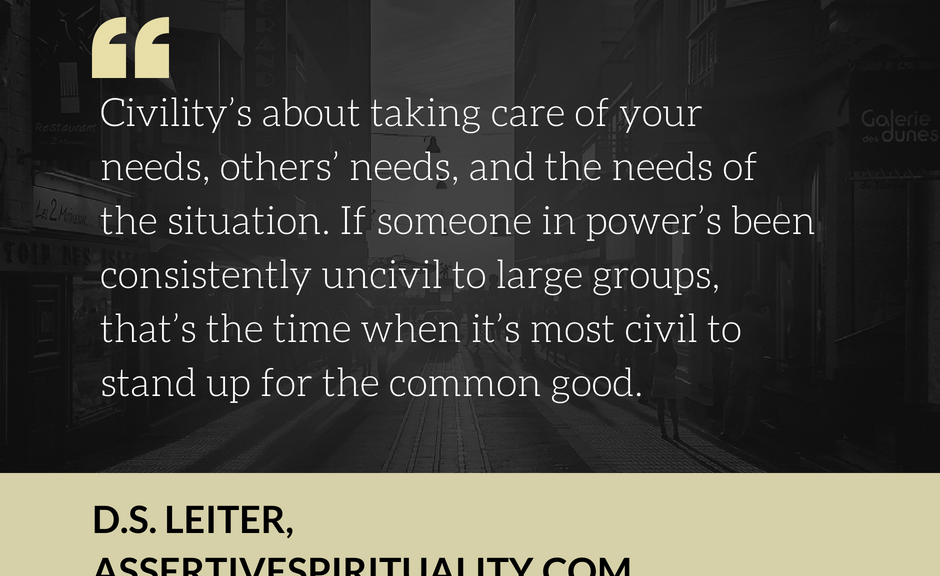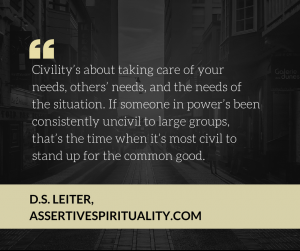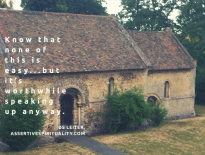
In Pursuit of True Civility; or, On Standing Up for the Common Good
There’s been a lot of flap about civility in the news lately, and I’ve seen it mirrored on my news feeds posted by friends, family, and acquaintances. “If we’re to ask for civility for the little guy, then we also need to give it to government employees,” they say. Or “You may not respect the man, but at least respect the office.”
As someone who’s been teaching about civility for years, and who’s also been away on a trip until recently, I’ve been holding my breath and grimacing a bit at these posts. Or, if I were comfortable being compared to a horse, I might say that I was chomping at the bit, impatient to get home so I could properly write about it.
So here it is.
Defining Civility
 I’ve said it briefly before: Civility involves caring for your needs, others’ needs, and the needs of the situation. If someone in power’s been consistently uncivil to large groups, that’s the time when it’s most civil to stand up for the common good.
I’ve said it briefly before: Civility involves caring for your needs, others’ needs, and the needs of the situation. If someone in power’s been consistently uncivil to large groups, that’s the time when it’s most civil to stand up for the common good.
Here’s why.
In a seemingly civil society, there are a LOT of needs and perceived needs to go around. There is usually no way to meet all of these needs, no matter what you do.
You can try, of course. But you’re unlikely to succeed. Civility that satisfies all groups is very difficult, even in the best of all possible circumstances with the best possible leaders.
In societies that propose to be civil societies, therefore, civility is more of an ideal than a reality.
Let me say that again. In civil societies, civility is more of an ideal than a reality.
We can achieve civility more often in one-on-one relationships and small groups, but only if we agree on what people’s needs are and how to be respectful in a wide range of situations, based on the type of relationship.
But even on a small scale, this is difficult. And it is further complicated if people ignore their own needs or the true needs of others. Or if we fail to do the proper reflection on the difference between needs and wants. Or if we fail to take the situation fully into account. Or a thousand other problems.
Differing perspectives make this more challenging, obviously. As do power relationships.
As I said above, civility is hard to achieve in a civil society, even with good leaders.
With many needs and perspectives in a civil society, someone is always likely to confuse their wants with their needs. Both individuals and groups tend to be selfish—and it’s hard to be civil when you’re only looking out for your needs or those of your group. And with consistently different perceptions of the situation and what needs to happen to achieve some sort of “respect for each person,” it’s nearly impossible, even with good leaders, for everyone to say, “Okay, we’ve reached peak civility here.”
It’s Never Easy! So We Need to Triage Needs
This civility business is freaking hard, even in the best of circumstances. Even then, you have people who may pretend that everything’s okay, but have buried resentments. More likely, you’ll have people who are screaming like crazy that their needs aren’t being met.
Why It’s Never Easy: The Exploiters and the Marginalized/Oppressed
There will always be people without empathy for other groups, unwilling to listen to the needs of others. As a follower of Christ, I’m convinced that this is why God worked so hard in the Bible to repeatedly call people not just to love others as they loved themselves, but also to look out for the poor and the oppressed. Because there always tend to be people that get left behind in the civility wars.
The way I see it, any cursory reading of the Bible should make it pretty clear, if only through the bulk of verses devoted to the subject, that God cares very much that the needs of those who are consistently marginalized and oppressed are cared for along with the needs of others.
Why It’s Never Easy: The Conflict-Avoidant Enablers
In addition to the power hungry and those without empathy, there are always people in the middle of the road, people who are conflict avoidant but who clothe it in the language of civility (on this site I’ve been calling this group the “Christian Nice” group). These people would often, if not always, rather not look at the wounds of the poor and the oppressed, because they’re hard to look at. People who would rather not look at or admit their own needs. Denial is natural, but denial is deleterious to civility.
So just imagine how hard it is when those in power go completely off the rails.
When people in power start mocking those in oppressed and marginalized groups, painting them as criminals. When those in power start diverting funds from those who need them to help themselves and their cronies at the expense of others.
In such situations, incivility from the top tends to trickle down. And those at the bottom get hurt most.
Hate crimes tend to go up because incivility and aggression and disrespect for certain groups has been modeled from the top. And those usually leaning toward exploitation have more leeway to exploit. This is simply how communication climates get formed and reinforced in relationships, in groups, and in societies. The negative climate coming from the top affects the lower layers most.
And those who fear conflict tend to enable it by ignoring or even defending the incivility at the top.
Sometimes the conflict-avoiders enable those at the top by demanding equal “civility” from everyone–which, because of the situation, is much more directed toward those in the oppressed groups, and those defending them, than it is at the top. It’s easier, after all, to ask those not in power to sit down and shut up than it is to ask the powerful to do so.
This hurts—you guessed it—those at the bottom.
An Important Note: In this situation I’ve described, anyone who resists this behavior did not create the state of incivility. The incivility was created by those in power and the exploiters.
Often those enablers calling for “civility for all” in these scenarios are trying the “all have sinned and should be equally chastised” trick I mentioned in my first “Christian Nice” article. This simply is not a civil thing to do in situations that require triage, because those at the bottom are the ones who get hurt most.
The Truly Civil Group: Let’s Call Them the Resistance, Just for Kicks.
In addition to the exploiters and the conflict-avoidant enablers, a third group tends to stand out. While the exploiters often seek to demonize them and the enablers often fall in line, this group remains the most civil people in this scenario. That is, those who stand up for those who are being exploited by the leaders’ bad behavior.
From a frame of Golden Rule spirituality, these are also the people who are truly loving their neighbors as themselves.
And for those working from a frame of Christian spirituality, those who are standing up for the Imago Dei in the poor and the oppressed are most clearly enacting love, respect, and kindness to the least of these.
Especially when that image looks remarkably like Christ broken and demeaned and treated as the lowest form of criminal on the cross.
This is what civility looks like. And it may be political, but it’s not really partisan.
Incidentally, many Scriptures also say this is what true religion looks like: “to look after orphans and widows in their distress” (James 1:27).
Whether or not you’re coming from a Christian frame, I hope you realize by now the following:
- Civility is complex and hard to achieve even in the best of times;
- That means that in the worst times—the times when many groups are getting trampled on, the most civil thing you can do is to stand up for the common good.
Difficult, but Worthwhile
We can do this, friends. Let’s stand up and strive to have as many needs met as possible. That likely means looking at things we may not want to look at and having compassion for people that we are taught to despise. Learning to empathize with the genuinely oppressed when we are being told they are worthless criminals is difficult, but vital, important work.
It may also mean taking a hard look at our own wants and sacrificing some of them so to better meet both our own needs and those of others.
It’s a Relay Marathon
Part of meeting these needs also includes taking breaks from this work at times. We need to treat this like a relay marathon, running our part and then being willing to hand off the burden to others for a time as well. But I have faith that the work is valuable, and well worth the perseverance.
Resist and persist, friends, toward the good of as many as possible, especially those being hurt by the current policies, including the “zero tolerance” immigration policies. It’s the only civil thing to do.
Go team Assertive Spirituality! We can do this thing, friends!
Related Posts:
- The Toxic Spirituality of “Christian (Midwest Middle Class White People) Nice”
- The Toxicity of “Christian Nice” Part 2: Some Tips to Counter Cordial Hypocrisy
- Swear-Policing Part 2/”Christian Nice” Part 3: The Robert DeNiro Vulgarity Case
- Christian Folk, Please Stop Enabling Human Rights Violations!
- How “Christian Nice” Literally Makes Us Sick
- Christian Folk, Let’s Stand Up Against Abuse
_______
Like this post? Want to continue the conversation? Comment, share it (bar on the bottom), sign up for our email list (in the pull down bar above) and/or stick around and check out our other content!

3 thoughts on “In Pursuit of True Civility; or, On Standing Up for the Common Good”
Well said. Civility and respect for the common good go hand in hand. Satire has a place in this discussion. Satire shines a harsh or genial light upon the way things are in order to move people toward the way things ought to be.
Agreed! As a wise monk friend once said, satire toward the powerful is speaking truth to power, whereas the same thing directed at the least is just mean.